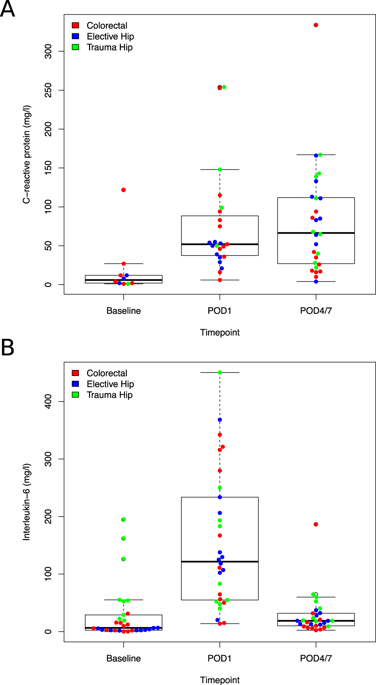Scientific Reports ( IF 3.8 ) Pub Date : 2020-04-01 , DOI: 10.1038/s41598-020-62262-x Ryoichi Sadahiro 1, 2 , Bridget Knight 2, 3 , Ffion James 2 , Eilis Hannon 2 , John Charity 3 , Ian R Daniels 3 , Joe Burrage 2 , Olivia Knox 2 , Bethany Crawford 2 , Neil J Smart 3 , Jonathan Mill 2

|
Surgery is an invasive procedure evoking acute inflammatory and immune responses that can influence risk for postoperative complications including cognitive dysfunction and delirium. Although the specific mechanisms driving these responses have not been well-characterized, they are hypothesized to involve the epigenetic regulation of gene expression. We quantified genome-wide levels of DNA methylation in peripheral blood mononuclear cells (PBMCs) longitudinally collected from a cohort of elderly patients undergoing major surgery, comparing samples collected at baseline to those collected immediately post-operatively and at discharge from hospital. We identified acute changes in measured DNA methylation at sites annotated to immune system genes, paralleling changes in serum-levels of markers including C-reactive protein (CRP) and Interleukin 6 (IL-6) measured in the same individuals. Many of the observed changes in measured DNA methylation were consistent across different types of major surgery, although there was notable heterogeneity between surgery types at certain loci. The acute changes in measured DNA methylation induced by surgery are relatively stable in the post-operative period, generally persisting until discharge from hospital. Our results highlight the dramatic alterations in gene regulation induced by invasive surgery, primarily reflecting upregulation of the immune system in response to trauma, wound healing and anaesthesia.
中文翻译:

大手术会导致与免疫反应途径相关的测量的 DNA 甲基化发生急性变化。
手术是一种侵入性手术,会引发急性炎症和免疫反应,从而影响术后并发症的风险,包括认知功能障碍和谵妄。尽管驱动这些反应的具体机制尚未得到很好的表征,但假设它们涉及基因表达的表观遗传调控。我们量化了从一组接受大手术的老年患者纵向收集的外周血单个核细胞 (PBMC) 中 DNA 甲基化的全基因组水平,将基线收集的样本与术后和出院时立即收集的样本进行比较。我们在免疫系统基因注释的位点发现了测量的 DNA 甲基化的急剧变化,在同一个体中测量的包括 C 反应蛋白 (CRP) 和白细胞介素 6 (IL-6) 在内的血清标志物水平的平行变化。尽管在某些位点的手术类型之间存在显着的异质性,但在不同类型的大手术中观察到的许多测量的 DNA 甲基化变化是一致的。手术引起的测量的 DNA 甲基化的急性变化在术后期间相对稳定,通常持续到出院。我们的研究结果突出了侵入性手术引起的基因调控的巨大变化,主要反映了免疫系统对创伤、伤口愈合和麻醉的反应上调。尽管在某些位点的手术类型之间存在显着的异质性。手术引起的测量的 DNA 甲基化的急性变化在术后期间相对稳定,通常持续到出院。我们的研究结果突出了侵入性手术引起的基因调控的巨大变化,主要反映了免疫系统对创伤、伤口愈合和麻醉的反应上调。尽管在某些位点的手术类型之间存在显着的异质性。手术引起的测量的 DNA 甲基化的急性变化在术后期间相对稳定,通常持续到出院。我们的研究结果突出了侵入性手术引起的基因调控的巨大变化,主要反映了免疫系统对创伤、伤口愈合和麻醉的反应上调。











































 京公网安备 11010802027423号
京公网安备 11010802027423号